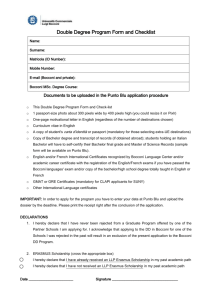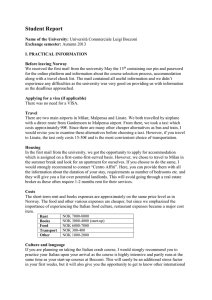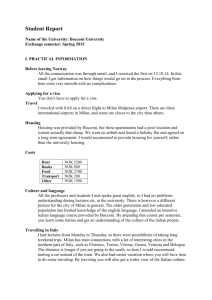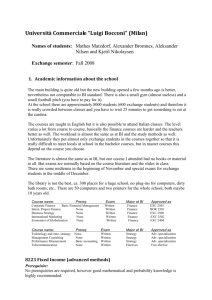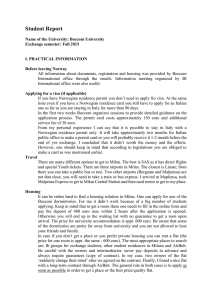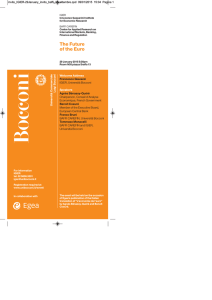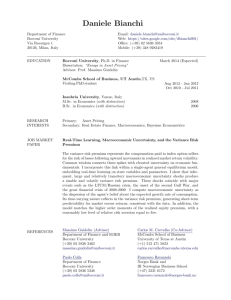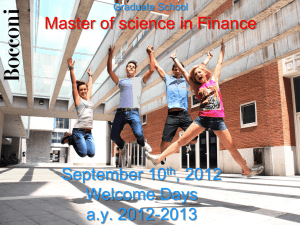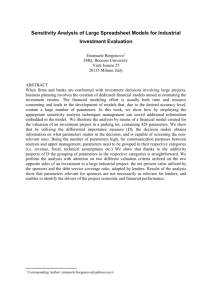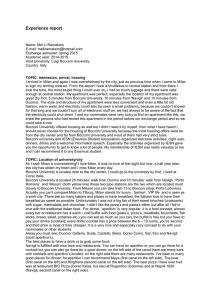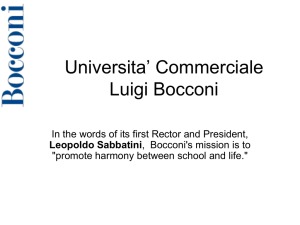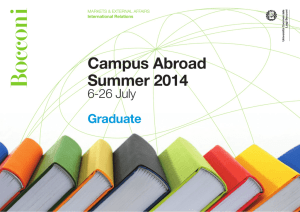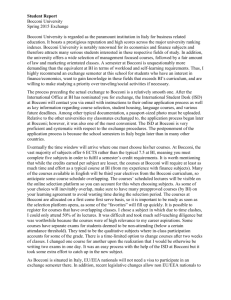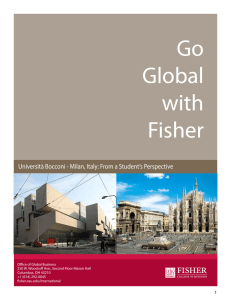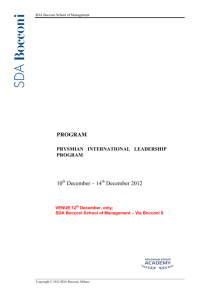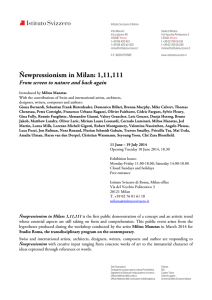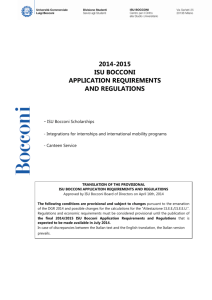Università Commerciale *Luigi Bocconi* (Milan)
advertisement
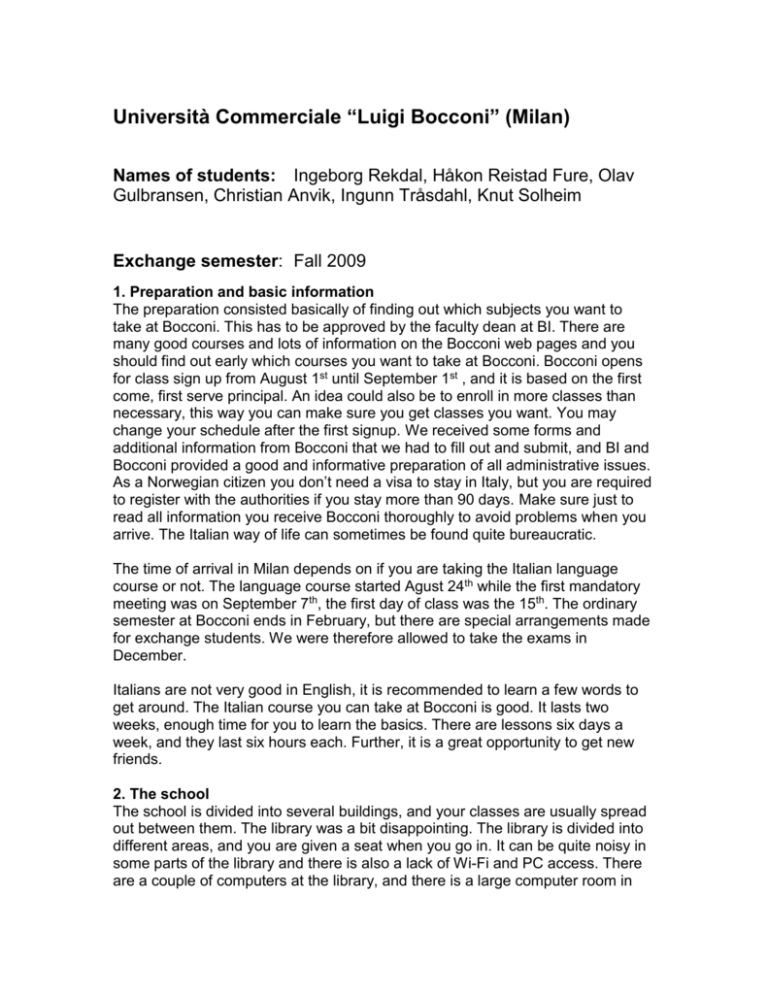
Università Commerciale “Luigi Bocconi” (Milan) Names of students: Ingeborg Rekdal, Håkon Reistad Fure, Olav Gulbransen, Christian Anvik, Ingunn Tråsdahl, Knut Solheim Exchange semester: Fall 2009 1. Preparation and basic information The preparation consisted basically of finding out which subjects you want to take at Bocconi. This has to be approved by the faculty dean at BI. There are many good courses and lots of information on the Bocconi web pages and you should find out early which courses you want to take at Bocconi. Bocconi opens for class sign up from August 1st until September 1st , and it is based on the first come, first serve principal. An idea could also be to enroll in more classes than necessary, this way you can make sure you get classes you want. You may change your schedule after the first signup. We received some forms and additional information from Bocconi that we had to fill out and submit, and BI and Bocconi provided a good and informative preparation of all administrative issues. As a Norwegian citizen you don’t need a visa to stay in Italy, but you are required to register with the authorities if you stay more than 90 days. Make sure just to read all information you receive Bocconi thoroughly to avoid problems when you arrive. The Italian way of life can sometimes be found quite bureaucratic. The time of arrival in Milan depends on if you are taking the Italian language course or not. The language course started Agust 24th while the first mandatory meeting was on September 7th, the first day of class was the 15th. The ordinary semester at Bocconi ends in February, but there are special arrangements made for exchange students. We were therefore allowed to take the exams in December. Italians are not very good in English, it is recommended to learn a few words to get around. The Italian course you can take at Bocconi is good. It lasts two weeks, enough time for you to learn the basics. There are lessons six days a week, and they last six hours each. Further, it is a great opportunity to get new friends. 2. The school The school is divided into several buildings, and your classes are usually spread out between them. The library was a bit disappointing. The library is divided into different areas, and you are given a seat when you go in. It can be quite noisy in some parts of the library and there is also a lack of Wi-Fi and PC access. There are a couple of computers at the library, and there is a large computer room in the main building. We recommend you use the smaller yet less populated computer room, just ask the help desk for directions There are two printers in each computer room, and no scanners. Luckily there are probably 4-5 different internet-café/ print shops nearby Bocconi, which appears to be the standard place for all Bocconi students to go fix their print work. Generally the IT facilities are below the standards we are used to at BI. There are some places for groupwork in the main building located at each floor, right outside the classrooms. The cantinas at Bocconi are good, but since there are approximately 8000 students at Bocconi, it can get very crowed there between classes. There are professional baristas and an espresso cost about 0,70 euro. There are also several cafés, bars and restaurants around the campus. 3. Subject description: The courses at Bocconi count for 6 ECTS points. You have the possibility to choose among a broad range of interesting topics, where most teachers speak understandable English. We all had about 10-13 hours of classes each week. There is also sadly enough quite often a lot of noise from the Italian students that show little respect for both the professors and their classmates. It is also possible to be non-attending students in all classes. 8145 International Corporate Finance Christian. A general course on some of the international aspects in finance, without going into depth. Professor did not meet expectations. We found this to be an easy course consisting of two multiple choice exams, 1 hour each, however we do not recommend this course. 8191 Investment Banking and Structured Finance The course focuses on two parts of structured finance, securitization and project finance. Several guest lecturers from banks and rating firms, in addition to having two professors teaching each part of the course. The professor in charge of the course is one of the best professors I have had. He has also written the textbook. Essential to attend classes to take lecture notes which are valuable preparing for the exam. Also recommended to attend the business game. 1 hour final exam. Christian recommends this course. 8307 - Mergers and Acquisitions This was an easy, interesting and good course. The class is among the most popular and most attended, thus it is advisable to not sit too far back in the classroom if you want to understand what is being said. As half of the students had never had corporate finance before, the lessons became rather simple, but it was overall an interesting course. 8188 - Asset Management Interesting and good course where you also learn basic Matlab. There are two assignments that have to be done besides the final exam. The first one is quite easy, while the second one is a bit more tedious. Knut, Håkon & Christian recommend this course. 8447 - Financial Econometrics and Applied Finance Quite theoretical course. 8344 - Management of fashion and luxury companies This is a course in marketing/strategy. It was an easy and interesting course (if you are interested in fashion). You can choose whether you want to be attending or non attending. If you are attending student there is a group assignment in addition to the final exam. It is not a difficult assignment, but it can be a little time consuming. The final exam for non attending students is longer (60 minutes compared to 45 minutes for attending students), and is supposed to be more difficult. Moreover, the lessons were interesting and varied, and the teacher good. 8461 – International economics and business dynamics Not recommended. Ingunn, Ingeborg, Olav & Christian. This course was somewhat easy, and we did not learn much new. The students are evaluated on basis of on an assignment/presentation and a final exam. This course is not recommended by Ingunn, Ingeborg, Olav & Christian. 8823 – Fixed Income (Advanced Methods) It is supposed to be the hardest course at Bocconi, but the professors are excellent and if you are considering a career within investment banking it is highly recommended. Will require some effort though, as it is likely the hardest course you will ever have. There are two different exam modules; either you sit two mid-terms or 1 final exam. If you sit the mid-term you will split the course in two rather than addressing all at one exam at the end of the year. Highly recommend to choose the two mid-terms modality. 4. Accomodation It is not necessarily easy to find housing in Milan. There are student dorms provided by the university, but we were advised to seek private apartments as the dorms are rather expensive and are located far away from the university. We found our apartments through rental agencies, housing web pages (facebook, halldis.com, eurohomes & others) and friends. You should expect to use between €500-€900 per month on living expenses. We would recommend to find a place nearby Bocconi or close to the city center. 5. Social life The social life in Milan and Bocconi is very good and Milan truly offers something for everybody’s taste. There are a lot of social activities going on for the student with international party in one of the clubs almost any day of the week. Milan has many good nightclubs, bars and places to eat. There are a lot of famous artist and DJs visiting Milan clubs. We recommend trying out the clubs Le Banque, Limelight, Hollywood, Old Fashion, Just Cavalli and Gatto Pardo. Gatto Pardo is definitively worth a visit; an old church with everything in marble and great music. You should also go exploring the endless amount of great places eating aperitivo. The concept is that you pay 7-10 Euros for any kind of drink, and then you eat as much as you want from a huge buffet. Aperitivo is served almost all over the city, from 19-22 and is a typical “after work” event, where you meet all sorts of people, students as well as business people. We can recommend the Navigli area as a great place to find good aperitivos, and specific places like Cheece, Twelve, Refeel. We would also recommend joining some of the Facebook groups that are organized by Bocconi students. It is very easy to travel around in Italy and the train system works very well. We all did some travelling during the weekends and visited places like Cinque Terre, Venice, Lake Como, Lake Garda, Verona, Bergamo, Varazze, Barbaresco, Barolo, Alba, Firenze etc. It is easy to travel from Milan, both by train and car. 6. Other practical and economic conditions: There are several airlines that fly to Milano, it is therefore quite easy to find cheap tickets. Just be aware of the amount of luggage you are allowed to bring, so you won’t need to pay overweight. Transportation in Milan is very cheap compared to what we are used to from Norway. A metro ticket costs one euro. A one month travel pass for students only costs 17 euro (27 euro the first month), which you can use on the metro, tram and bus. The student card can only be bought in a few selected metro stops (including the metro stop “duomo”). All of us also ended up getting bicycle passes so we could use the city bikes that are placed all over Milan. Taxies are also cheap, half the price of Oslo. For any further questions feel free to get in touch with us. Our contact details are: Ingunn Tråsdahl Ingunn.trasdahl@student.bi.no Håkon Reistad Fure hakon.reistad.fure@studen.bi.no Christian Anvik christian.anvik@student.bi.no Olav Gulbrandsen olavgul@hotmail.com Ingeborg Rekdal ingeborg.rekdal@student.bi.no Knut Solheim knut.solheim@student.bi.no
